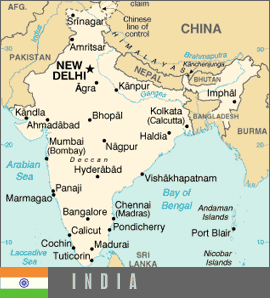Thursday, February 23, 2006
U.S. Wants India's Cooperation, While Offending Indian Scientific Community

In a diplomatic effort, the U.S. is attempting to get India to separate their military and civilian nuclear programs--to reduce the possibility of the diversion of U.S. made technology from energy programs to weapons programs.
Days before he leaves for South Asia, President Bush publicly urged India yesterday to separate its civilian and military nuclear programs to pave the way for a new strategic alliance between Washington and New Delhi.Bush agreed in July to give India access, for the first time, to civilian nuclear assistance, breaking with decades of U.S. nuclear policies. For the Bush administration, the deal was part of a long-term Asian strategy designed to accelerate India's rise as a global power and as a counterweight to China. The White House had hoped to finalize the accord next week when Bush becomes the first U.S. president to visit India and Pakistan since the two South Asian rivals conducted nuclear tests in 1998...
U.S. law forbids exporting nuclear materials to sites or facilities that are used for bombmaking. For Congress, the military-civilian separation plan is seen as a key indicator of whether New Delhi intends to use the deal to help its weapons production, or its energy sector.
The Indian military is not so keen about the U.S. idea:
In December, Indian negotiators surprised their U.S. colleagues when they proposed keeping a majority of the facilities under military control. In particular, the Indians suggested to senior U.S. officials, including Undersecretary of State R. Nicholas Burns, the chief negotiator, that they wanted military control over fast-breeder reactors, at least until 2010. The reactors are in the experimental phase but will be able to produce enormous quantities of weapons-grade plutonium when fully operational...
At a meeting last week of nuclear weapons experts, David Albright, president of the Institute for Science and International Security, suggested that India's plans for the breeder reactor were evidence of "a greedy effort to try to have as much of a plutonium production capability for nuclear weapons as possible."
"India has to choose," Albright said. "Does it want nuclear weapons capabilities, or does it want international cooperation?"
A decision two weeks ago by a U.S. consulate in India to refuse a visa to a prominent Indian scientist has triggered heated protests in that country and set off a major diplomatic flap on the eve of President Bush's first visit to India.
The incident has also caused embarrassment at the highest reaches of the American scientific establishment, which has worked to get the State Department to issue a visa to Goverdhan Mehta, who said the U.S. consulate in the south Indian city of Chennai told him that his expertise in chemistry was deemed a threat...
Mehta's case has especially angered Indians because he was a director of the Indian Institute of Science and is a science adviser to India's prime minister. He has visited the United States "dozens of times," he said, and the University of Florida in Gainesville had invited him to lecture at an international conference.
Are we worried now about Hindu terrorism?


